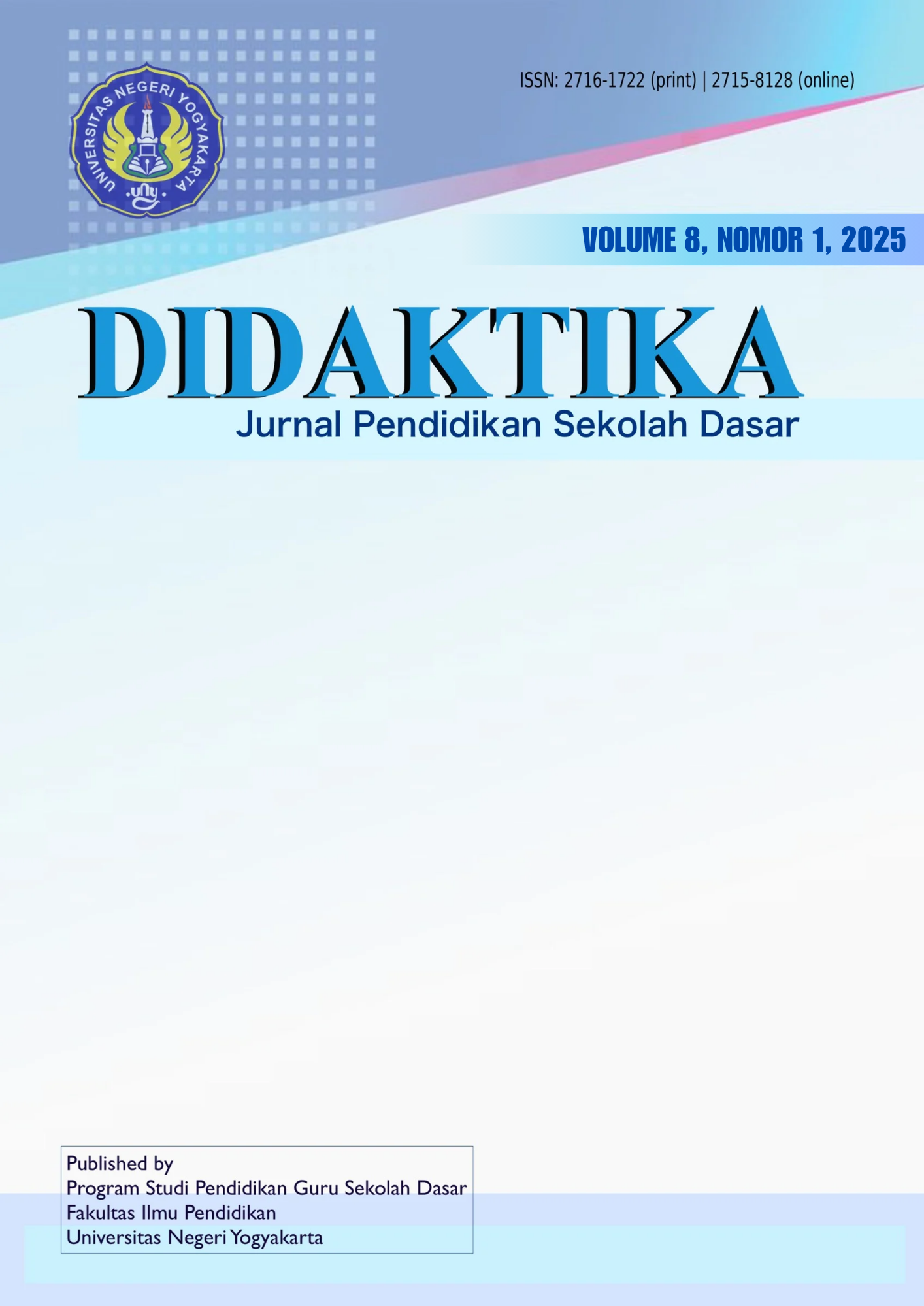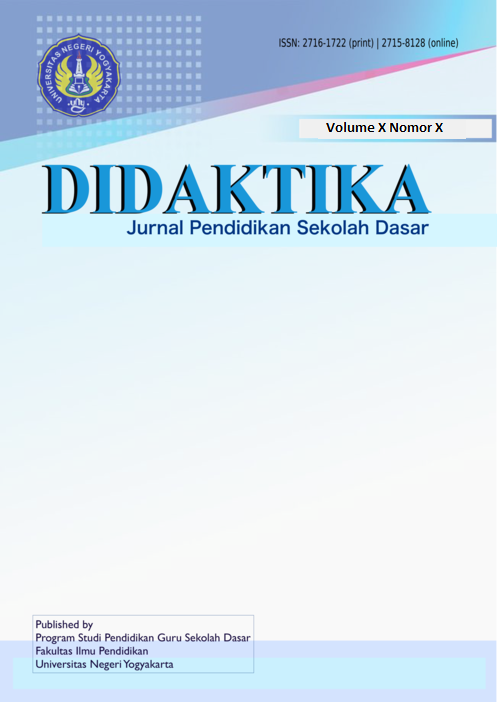The Historical Development of Primary and Islamic Education in Indonesia: From Empire to Reform Era
DOI:
https://doi.org/10.21831/didaktika.v8i1.83921Abstract
The phrase "Never Leave History" (Jasmerah) from Soekarno emphasized the importance of historical awareness. This article examines the evolution of basic education and basic Islamic education in Indonesia from the Islamic kingdom to the Reform era with a qualitative approach based on a literature review. Key findings reveal a significant shift in the Islamic basic education curriculum, transforming from a traditional Islamic boarding school-based approach to a formal school model that integrates modern science and technology. In addition, a dynamic pattern of education policy was found, seeking to balance the preservation of local-religious values with the demands of modernization and national development. This study also confirms that Islamic education functions not only as a transmission of knowledge but as a process of forming character, social identity, and cultural resilience according to Islamic teachings. The implications of this research are very important for the development of education policies that are inclusive, holistic, and responsive to social and cultural change. The unique contribution of this research can be seen from the cross-era analysis that provides a comprehensive picture of the resilience and adaptability of Islamic education in the face of socio-political challenges, while strengthening the historical foundations and Islamic values in the national education system.
References
A. Mustafa dan Abdullah Aly. (1998). Sejarah Pendidikan Islam di Indonesia. Bandung: Pustaka Setia.
Afiful Ikhwan. (2017). Kajian Sosio-Historis Pendidikan IslamIndonesia Era Reformasi. Edukasi, 05(01).
Aletheiani, D. R. (2021). Public-Oriented Alternatives to Dominating Control of Schooling Exemplified by Raden Adjeng Kartini and Ki Hadjar's Taman Siswa Schools in Indonesia. In Oxford Research Encyclopedia of Education. https://doi.org/10.1093/acrefore/9780190264093.013.1139
Al-Hasyimi, U. S. (2024). The Essence of Knowledge in Al-Qur'an. Cakra Journal of Science, 1(1), 51–56.
Ary Gunawan. (1986). Kebijakan-Kebijakan Pendidikan di Indonesia. Jakarta: Bina Aksara.
Assegaf, Abd. R. (2005). Politik Pendidikan Nasional Pergeseran Kebijakan Pendidikan Agama Islam dari Praproklamasi ke Reformasi. Yogyakarta: Kurnia Kalam.
Daulay, H. P., & Pasa, N. (2016). Pendidikan Islam Dalam Lintasan Sejarah. Jakarta: Kencana.
Fadhli, M., Prasetyo, M. A. M., Siregar, M. F. Z., Pasaribu, M. H., & Sari, D. D. (2024). Perspective on Improving School Quality: The Influence of Teamwork and Curriculum Effectiveness in Islamic Schools. Journal of Education and Learning (EduLearn), 18(3), 858–867.
Gaus, D. (2017). Pendidikan Islam Indonesia dan Tantangan Globalisasi: Perspektif Sosio-Historis. Jurnal Kependidikan Dasar Islam Berbasis Sains, 2(1), 1–22.
Hendawi, M., Murshidi, G. A., Asrori, A., Hadi, M. F., Huda, M., & Lovat, T. (2024). The Development of Islamic Education Curriculum from the Quranic Perspective. Ar-Fachruddin: Journal of Islamic Education, 1(2), 93–123. https://doi.org/10.7401/hms52091
Hidayat, T., & Suryana, T. (2018). Menggagas Pendidikan Islami: Meluruskan Paradigma Pendidikan di Indonesia. Jurnal Pendidikan Islam Indonesia, 3(1), 75–91.
Hussain, A., Ahmad, M., & Ali, S. A. (2024). Exploring the Concepts of Halal and Haram in Islam and Their Scientific Perspective: A Systematic Literature Review. Journal of Halal Industry & Services, 7(1). https://doi.org/10.36877/jhis.a0000559
Khoiri, Q. (2017). Paradigma Pendidikan Islam Pasca Reformasi.
Kusmayadi, Y. (2018). Sejarah Perkembangan Pendidikan di Priangan 1900-1942. Jurnal Artefak, 4(2), 141–152. https://doi.org/10.25157/ja.v4i2.908
Lim, W. M. (2023). Philosophy of science and research paradigm for business research in the transformative age of automation, digitalization, hyperconnectivity, obligations, globalization and sustainability. Journal of Trade Science, 11(2/3), 3–30. (world). https://doi.org/10.1108/JTS-07-2023-0015
Malik, M. S., & Sukiman, S. (2021). Development and Implementation of Curriculum Adaptation During The Covid-19 Pandemic. Edukasia : Jurnal Penelitian Pendidikan Islam, 16(1), 125–146. https://doi.org/10.21043/edukasia.v16i1.10495
Masnuah, S., Khodijah, N., & Suryana, E. (2022). Analisis Kebijakan Pendidikan Islam dalam Undang-undang No. 20 Tahun 2003 (Sisdiknas). MODELING: Jurnal Program Studi PGMI, 9(1), 115–130. https://doi.org/10.69896/modeling.v9i1.1131
Miles, M. B., & Huberman, A. M. (2009). Analisis Data Kualitatif: Buku Sumber tentang Metode-Metode Baru. Jakarta: UI Press.
Muhammad Rifa'i. (2011). Sejarah Pendidikan Nasional Dari Masa Klaasik Hingga Modern. Yogyakarta: Ar-Ruzz Media.
Nata, A. (2016). Ilmu Pendidikan Islam. Jakarta: Kencana.
North, B. B. (2021). Love of Wisdom. In Oxford Research Encyclopedia of Education. https://doi.org/10.1093/acrefore/9780190264093.013.1476
Roqib, M. (2021). Increasing Social Class through Islamic Boarding Schools in Indonesia. Journal of Social Studies Education Research, 12(2), 305–329.
Sabarudin, M. (2015). Pola dan Kebijakan Pendidikan Islam Masa Awal dan Sebelum Kemerdekaan. TARBIYA: Jurnal Ilmu Pendidikan Islam, 1(1), 139–174.
Suharno, Pambudi, N. A., & Harjanto, B. (2020). Vocational education in Indonesia: History, development, opportunities, and challenges. Children and Youth Services Review, 115, 105092. https://doi.org/10.1016/j.childyouth.2020.105092
Thosimah, Khair, F., Umar, S., & Muslikhin, J. I. M. (2024). The History of The Spread of Islam In India and Its Relationship With Islam in The Archipelago: A Critical Review. Amorti: Jurnal Studi Islam Interdisipliner, 22–26. https://doi.org/10.59944/amorti.v3i1.232
Wu, D. (2024). Exploring digital literacy in the era of digital civilization: A framework for college students in China. Information Services and Use, 44(2), 69–91. https://doi.org/10.3233/ISU-230199
Zaini, M. F., & Pasaribu, M. H. (2020). Curriculum Planning In Boarding School Tahfizil Qur'an Islamic Center Foundation. Journal Of Education And Teaching Learning (JETL), 2(1), 1–9. https://doi.org/10.51178/jetl.v2i1.50
Downloads
Published
How to Cite
Issue
Section
Citation Check
License
Copyright (c) 2025 Muh Syauqi Malik, Kartika Dwi Astuti, Vit Ardhyantama, Muhammad Imaduddin, Hana Andriningrum, Helda Kusuma Wardani

This work is licensed under a Creative Commons Attribution-ShareAlike 4.0 International License.
- Authors retain copyright and grant the journal right of first publication with the work simultaneously licensed under a Creative Commons Attribution License that allows others to share the work with an acknowledgement of the work's authorship and initial publication in this journal.
- Authors are able to enter into separate, additional contractual arrangements for the non-exclusive distribution of the journal's published version of the work (e.g., post it to an institutional repository or publish it in a book), with an acknowledgement of its initial publication in this journal.
- Authors are permitted and encouraged to post their work online (e.g., in institutional repositories or on their website) prior to and during the submission process, as it can lead to productive exchanges, as well as earlier and greater citation of published work.







